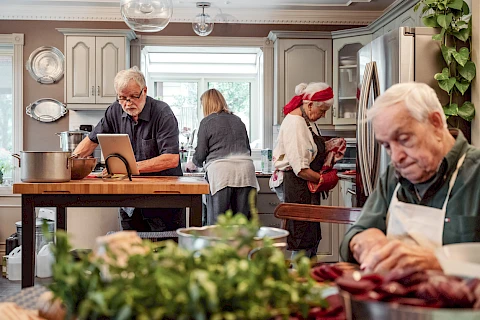
As people age, maintaining social connections becomes more beneficial than ever. One option that is gaining traction for seniors seeking a community-focused lifestyle is senior cohousing. These communities aim to foster social wellness and provide built-in support networks that can significantly enhance quality of life. Understanding how these living options work can help you make informed decisions about whether senior cohousing aligns with your personal preferences and needs.
What Is Senior Cohousing?
Senior cohousing is a collaborative housing arrangement where individuals have private living spaces but share common areas and activities. This living style emphasizes collaboration, mutual support, and community.
Unlike traditional senior living options such as retirement homes, cohousing communities are created and run by the seniors themselves, which promotes a sense of ownership and belonging. Think of a neighborhood where everyone knows each other, but with a focus on supporting one another as people age.
Communities can range from small apartments clustered around a common house to larger complexes, often including shared kitchens, gardens, or recreational spaces. Each community is unique, catering specifically to its members' needs and interests.
Social Benefits of Cohousing
One of the most significant advantages of senior cohousing is the built-in social connections it provides. Unlike living in isolation or a traditional senior facility, residents of cohousing communities are constantly engaged with others, which naturally leads to the formation of lasting friendships and a robust support network.
They organize activities around shared interests, be it gardening, crafting, or exercise. Frequent interactions reduce loneliness and create a sense of belonging. For seniors, who may be at a higher risk of experiencing isolation, this kind of connection can make a meaningful difference in overall well-being.
Emotional and Health Advantages
Cohousing isn't just about having friends around. It's also about promoting mental and physical health. Seniors who engage in active community living tend to have better mental health and a reduced risk of depression.
Being part of a community encourages seniors to stay active and engage in healthy lifestyles, from regular walks to participating in group exercise classes or cooking nutritious meals together. Seniors just need to consult their doctor before starting a new exercise routine.
When health needs arise, there's a reliable support system already in place. Neighbors often help each other with errands, doctors' appointments, and other daily tasks, offering peace of mind that help is always nearby.
Practical Considerations for Seniors
If you're a senior considering cohousing, evaluate whether the community's values and activities align with your interests and needs. Ensure that you feel comfortable and at home.
Financial planning is another critical aspect. While cohousing can be cost-effective, it does require an initial investment and ongoing participation in community costs. Discussing options with a financial advisor can be beneficial.
Take the time to visit potential communities. Meet with current residents and participate in community events to get a real sense of what life is like there. This due diligence can help ensure you find the right community for you.
Experience Tailored Senior Care and Support From Senior Helpers
Senior cohousing communities offer numerous benefits, from built-in social connections to improved health and well-being. They can transform the way seniors experience aging, making their later years richer and more fulfilling. If you’re seeking routine home care in the Hershey, Halifax, Hummelstown, Palmyra, or Lykens areas, contact us at Senior Helpers Hershey. We provide professional home care and solutions, ensuring seniors continue to thrive in their golden years.